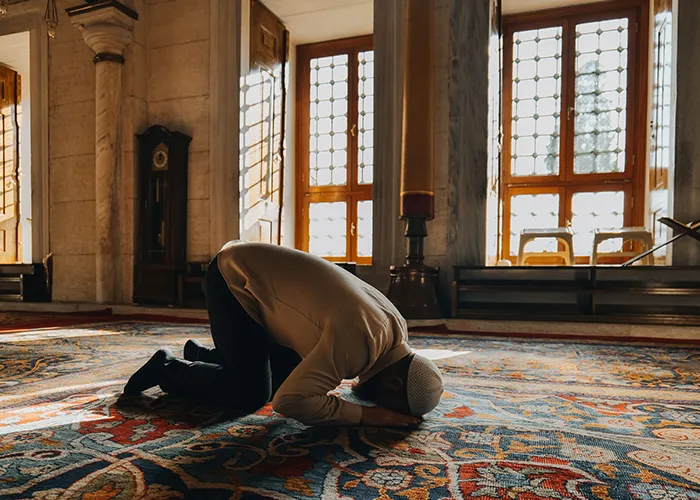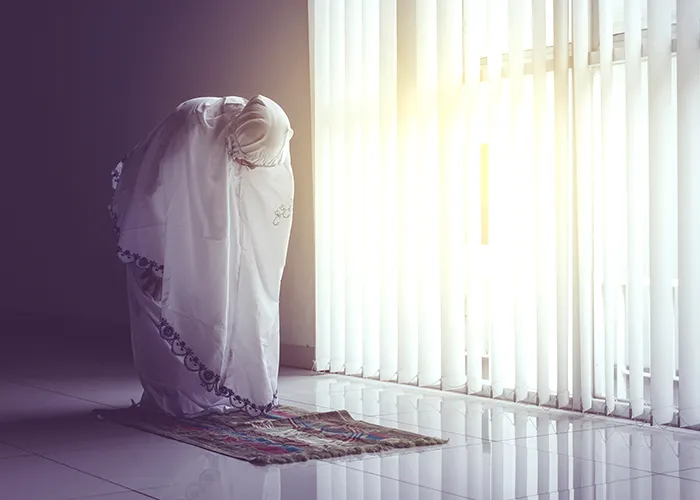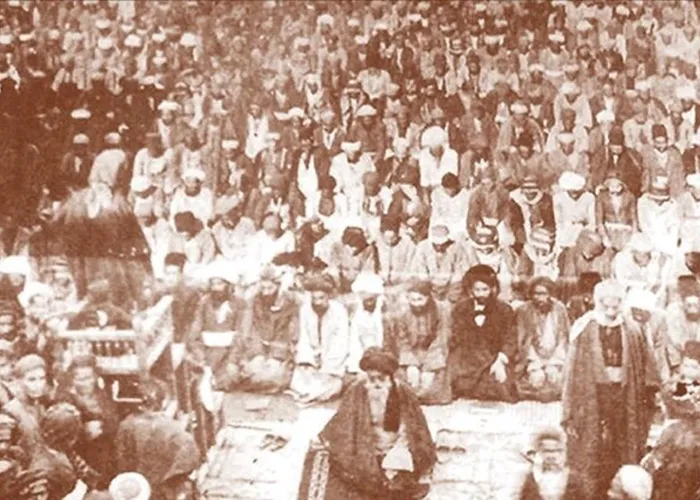Fatwa Panel of the Week – Volume02 Issue44
Obligatory Acts of Prayer
According to the fatwas of the Grand Religious Authorities: Ayatollah Sayyed Ali Khamenei, Ayatollah Sistani, and Ayatollah Makarem Shirazi (may Allah prolong their blessings):
Fatāwā presented without citing a differing opinion or a specific reference are the common rulings shared by the three respected Marāji‘. In cases where the ruling of one Marjaʿ differs from that of the other two, it is indicated in a footnote under the same number, mentioning the Marjaʿ by name.
Rulings of Prostration (Sajdah)
1. In every unit (Rak’ah) of the obligatory and recommended (mustaḥab) prayers, one must perform two prostrations (sajdah) after the bow (rukū‘), i.e., put one’s forehead on the ground out of humility before Allah.
2. In the prostration (sajdah), it is obligatory to place seven body parts on the ground: the forehead, the palms, the knees, and the tips of both big toes.
Ayatollah Sistani: The intended part of the forehead — based on obligatory precaution — is its middle section. It is a rectangular area defined by drawing two imaginary lines upward from between the eyebrows to the hairline.
3. The two prostrations (sajdah) in one unit (Rak’ah) of prayer together comprise one foundational element (rukn), meaning that if a person, intentionally or forgetfully, omits them or adds two more prostrations (sajdah) to them, their prayer becomes invalid.
Ayatollah Sistani: The two prostrations together constitute one essential pillar (rukn) of the prayer. If a person — even out of forgetfulness or ignorance of the ruling — omits both of them in a single unit (rak‘ah) of an obligatory prayer, his prayer becomes invalid. The same applies — based on obligatory precaution — if one adds two prostrations in a single unit out of forgetfulness or excusable ignorance (jahl-e quṣūrī), that is, when the person is not blameworthy for his ignorance.
4. If one intentionally adds or omits one prostration (sajdah), their prayer is invalid.
5. If one forgetfully or by mistake adds or omits one prostration (sajdah), their prayer is not invalid, but there are rules about this that will be mentioned later.
6. If one, intentionally or by mistake, does not place his forehead on the ground, it is not considered a prostration (sajdah), even though the other six body parts (palms, knees, and tips of both big toes) are on the ground. However, if one places their forehead on the ground, but mistakenly does not place some other body part on the ground or mistakenly does not recite the remembrance of Allah (dhikr), the prostration (sajdah) prostration is valid.
7. In prostrating (sajdah), there is no problem in placing some other toes on the ground in addition to the two big toes.
The obligatory dhikr (remembrance) in prostration:
1. The obligatory remembrance of Allah (dhikr) in the prostration (sajdah) is “subḥāna rab- bī al‘alā wa biḥamdih” recited once or “subḥānallāh” recited three times. It is also sufficient for one to say another remembrance of Allah (dhikr), such as “alḥamdu lillāh” or “Allāhu akbar”, (except for the remembrance of Allah [dhikr] recited in bowing [rukū‘]), the same number of times.
Ayatollah Sistani: It is better, in normal circumstances, to say “Subhānallāh” three times, or “Subhāna rabbī al-a‘lā wa bi-ḥamdih” once during prostration. These words must be said consecutively and in correct Arabic. Although any form of dhikr (remembrance) suffices, based on obligatory precaution it should be at least of this extent. It is recommended to say “Subhāna rabbī al-a‘lā wa bi-ḥamdih” three, five, seven, or more times.
Ayatollah Makārim Shīrāzī: The dhikr in prostration is also obligatory, and as a precaution, one should say at least “Subhānallāh” three times, or “Subhāna rabbī al-a‘lā wa bi-ḥamdih” once. The more it is repeated, the better.
2. There is no problem if one mistakenly says the remembrance of Allah (dhikr) of bowing (rukū‘) for the prostration (sajdah) or vice versa. The same rule applies if one does it intentionally but with the intention of merely reciting a remembrance of Allah (dhikr) [i.e., not as a prescribed remembrance of Allah (dhikr) in prayer]. However, one should say the prescribed remembrance of Allah (dhikr) of the bow (rukū‘)/prostration (sajdah) as well.
3. If after performing the bow (rukū‘) and prostration (sajdah), the praying person realizes that they have said the remembrance of Allah (dhikr) of the bow (rukū‘) or the prostration (sajdah) wrongly, the prayer is valid.
news via inbox
Subscribe to the newsletter.




